In the chemical industry, compressed air is more than a source of power; it is the fourth utility: equally crucial as electricity, water, and gas. When working with volatile chemicals, critical reactions, and high-quality standards, the quality of your compressed air system is a direct reflection of your operational stability, safety, and profitability. A system that is improperly specified exposes you to unacceptable risk of contamination and non-compliance.
This guide details the critical considerations for specifying, operating, and maintaining compressed air systems in the chemical sector. It explains how to mitigate risks and ensure your operations are safe, compliant, and efficient — with tailored Atlas Copco solutions from Anglian Compressors, a branch of Atlas Copco.
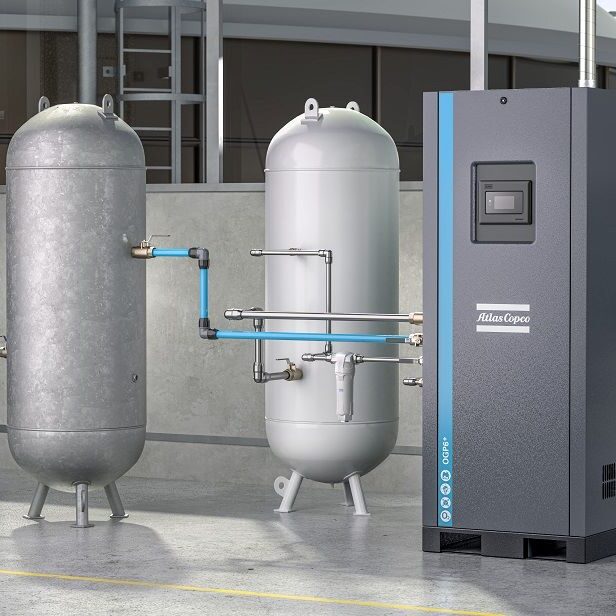
The Critical Role of Compressed Air in Chemical Processes
Compressed air is integral to nearly every stage of chemical production. Its applications are broadly divided by whether the air makes direct contact with the product, a distinction that dictates the required level of air purity.
- Direct Contact (Process Air): In this case, compressed air is effectively a raw material. Its purity is critical.
- Aeration and agitation: Supplying air to bubble through reactors and mixing vessels to keep chemicals homogeneous and facilitate reactions.
- Product drying: To speed up the drying out of raw materials or finished products, if residual moisture would adversely affect product stability.
- Enhancing Reactions: Delivering a clean and controlled source of oxygen, for example, to carry out oxidation.
- Indirect Contact (Instrument & Plant Air): This air is used to power machinery and systems where purity is essential to eliminate the risk of unintentional contamination.
- Pneumatic Control Systems: These systems are used to operate actuators, control valves, and cylinders, which in turn control flow and pressure. Often, the only solution is in explosive atmospheres.
- Pneumatic Conveying: Transporting powders and granules through pipework in a contained system that does not leak to the environment.
- Nitrogen generation: Feed air for on-site nitrogen generators used for inerting and blanketing.
- Safety Systems: Operating emergency shutdown valves and creating "air curtains" to separate atmospheric zones.
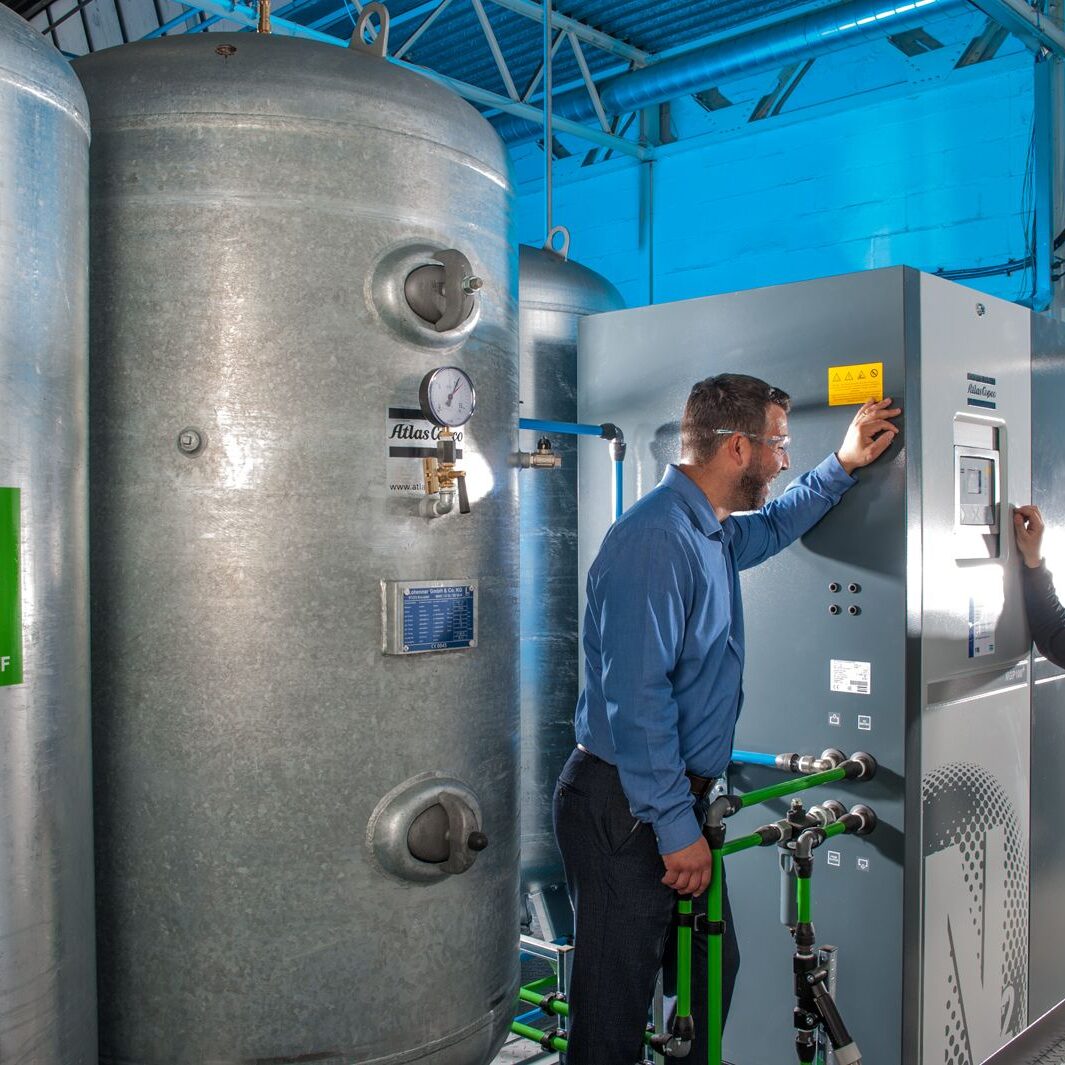
Contamination: The Highest Operational Risk
The single most significant risk arising from a wrongly specified compressed air system has to be contamination, by oil, water, or solids, which could result in:
- Product spoilage - a small quantity of oil entering the process could spoil a batch, resulting in a significant financial loss due to wasted material and production time.
- Process failure - oil aerosols can lead to fouling of sensitive pneumatic controls. Moisture in the system can lead to corrosion in pipework and equipment, resulting in process failure and costly unscheduled downtime.
- Safety hazards - oil carry-over to a high-temperature process could produce a combustible mixture or react with process chemicals, creating a dangerous situation.
Risk mitigation, quality assurance, and plant safety are compelling reasons to justify investing in a high-quality, correctly specified compressed air system.
ISO 8573-1 and the Gold Standard of Class 0 Air Purity
To manage contamination risk, the industry relies on the ISO 8573-1 standard to classify the purity of compressed air. The standard specifies maximum allowable levels for solid particulates, water, and total oil. For critical chemical applications, the most crucial classification is for oil.
There is a critical distinction between Class 1 and Class 0 air:
- Class 1: Specifies a maximum oil concentration of 0.01 mg/m³. This is often called "technically oil-free" and is achieved using an oil-lubricated compressor with a multi-stage filtration system. This approach carries an inherent risk: if the filtration fails, catastrophic oil contamination of the downstream process is inevitable.
- Class 0: This is the most stringent classification. A Class 0 certified compressor guarantees 100% oil-free air delivery. The compressor is designed so that no oil can enter the compression chamber. This eliminates the risk of contamination from the compressor itself.
For the chemical industry, specifying an ISO 8573-1 Class 0 certified compressor is the ultimate risk mitigation strategy. For more details on how oil-free systems compare to traditional setups, see our guide on Oil vs Oil-Free Air Compressors. For absolute peace of mind, this purity can be verified through professional Compressor Air Quality Testing, which provides documented proof of compliance.
Designing a Complete System with Atlas Copco Technology
Achieving Class 0 air at the point of use requires more than just an oil-free compressor; it demands a fully engineered system. As a premier Atlas Copco distributor since 1977, we design systems that guarantee purity and reliability.
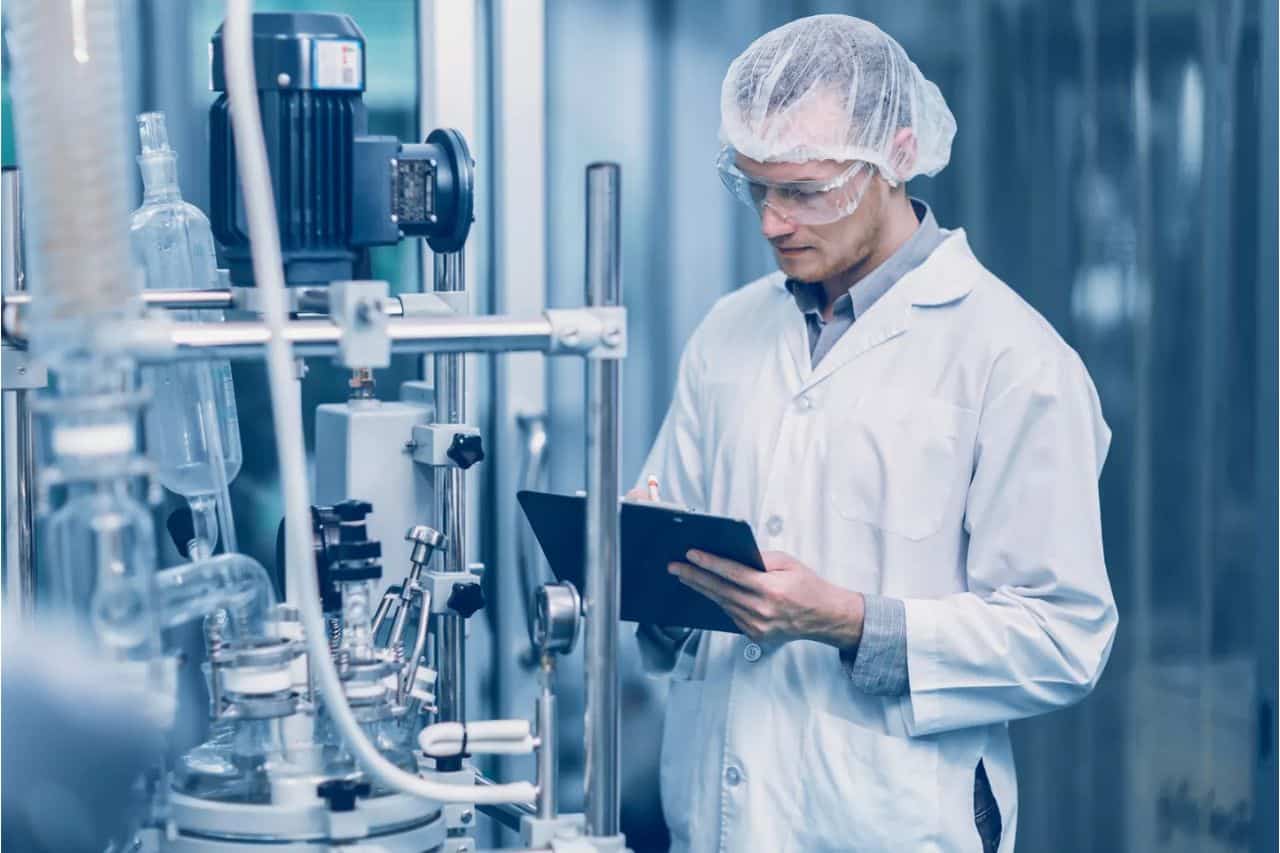
Oil-Free Compressor Technology
Atlas Copco offers a range of oil-free technologies suited for different demands in chemical manufacturing processes:
- Oil-Free Rotary Screw Compressors (ZR/ZT Series): The versatile and highly efficient workhorse for a majority of plant applications.
- Oil-Free Centrifugal Compressors (ZB/ZH Series): Ideal for large-scale facilities with substantial and continuous air demand, offering unparalleled energy efficiency.
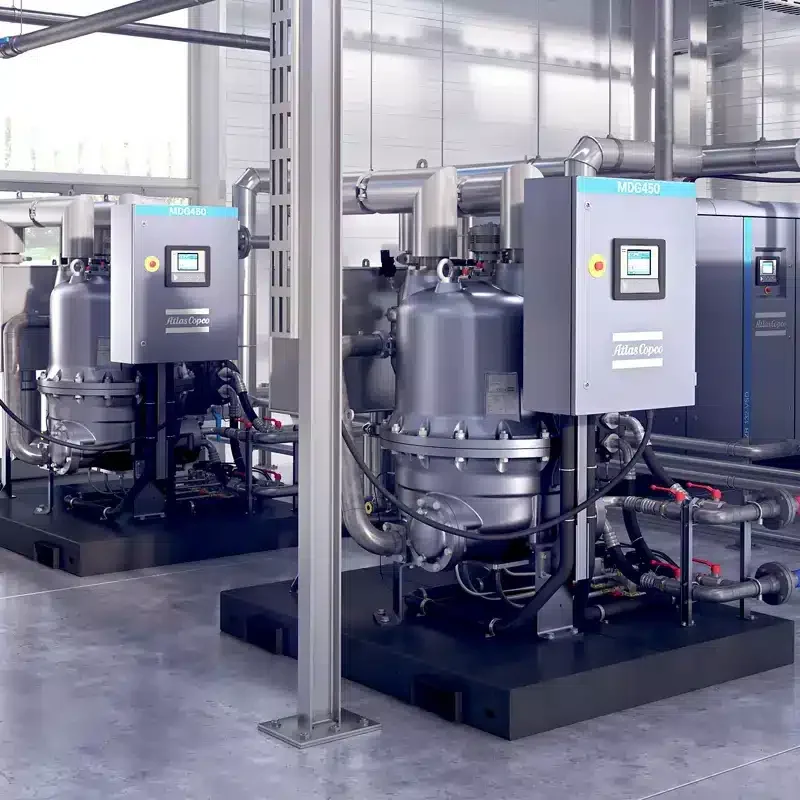
Essential Air Treatment
Ambient air contains water vapour and particulates that are concentrated during compression. A complete system must include:
- Desiccant dryers (PDP -40°C to -70°C): For freeze protection and moisture-sensitive reactions.
- Coalescing filters: Remove aerosols and fine particles.
- Activated carbon filters: Remove odours and hydrocarbons.
A multi-stage system of Compressed Air Filters is essential to remove any hydrocarbon vapours and particulates drawn in from the atmosphere.
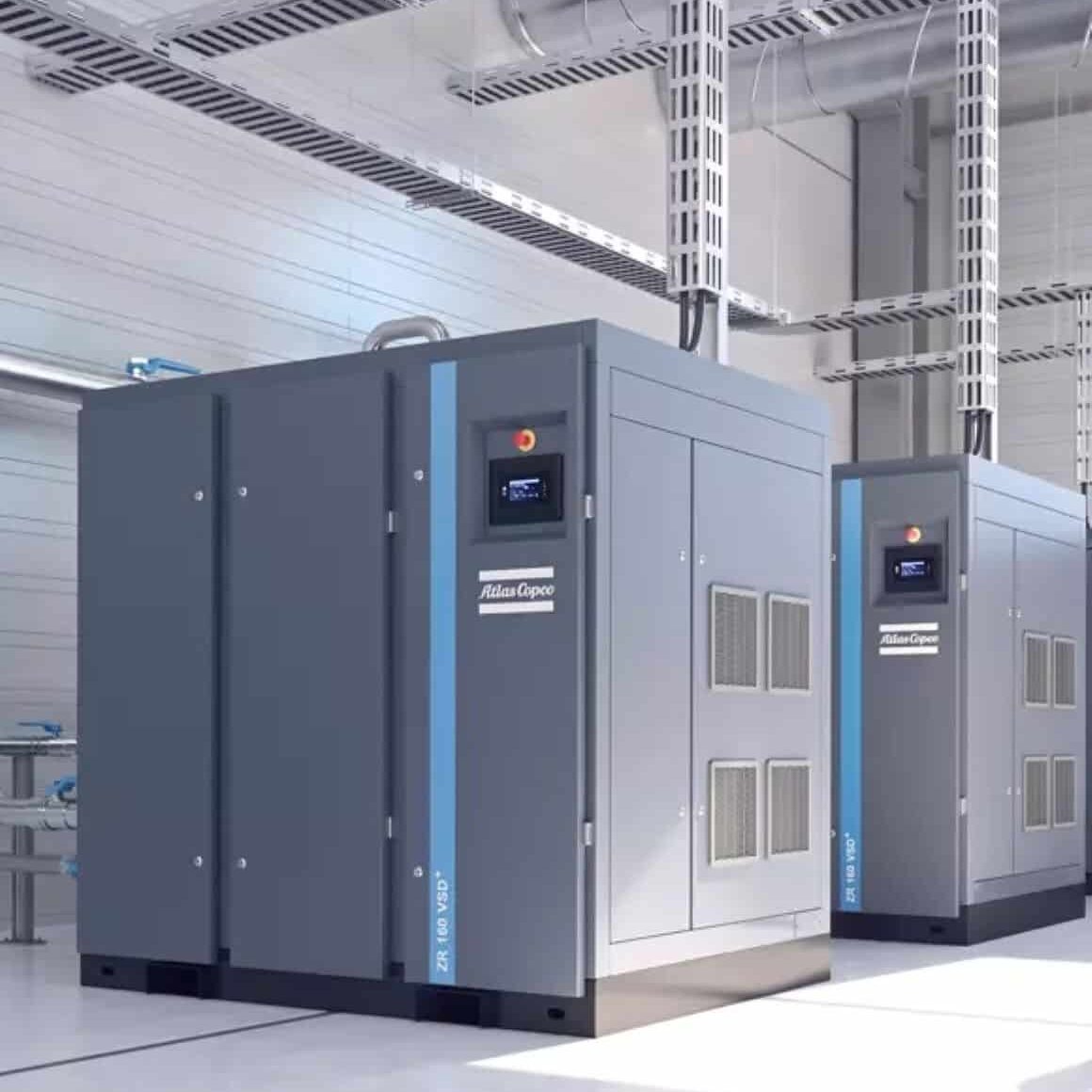
On-Site Nitrogen Generation
Oil-free compressed air is a prerequisite for high-purity on-site nitrogen generation. Through the use of PSA or membrane technology, on-site nitrogen generators supply continuous, cost-effective, safe nitrogen for inerting, purging, blanketing, and more without the need for bulk liquid deliveries. Find out more about our Nitrogen Generators for chemical manufacturing plants.
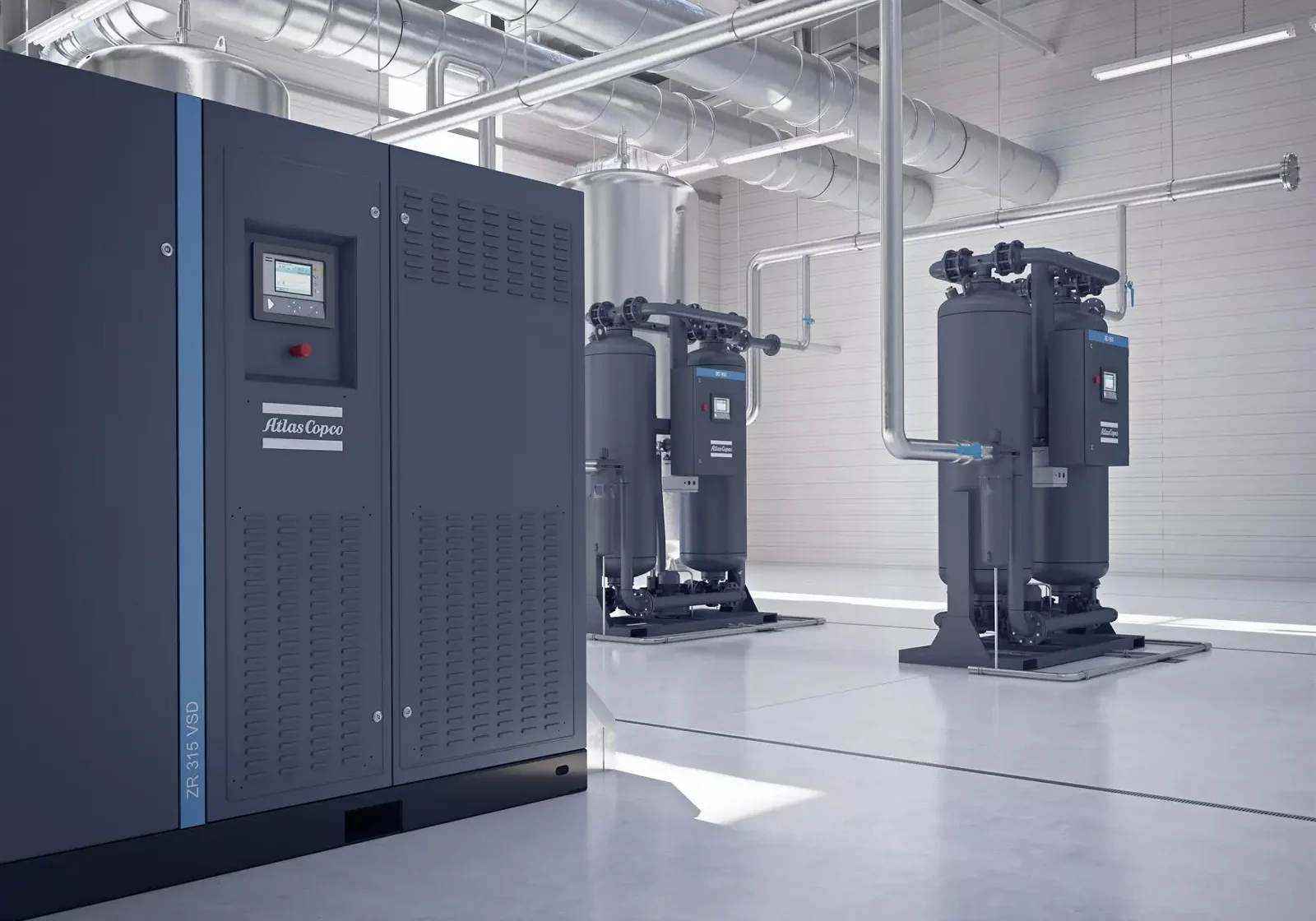
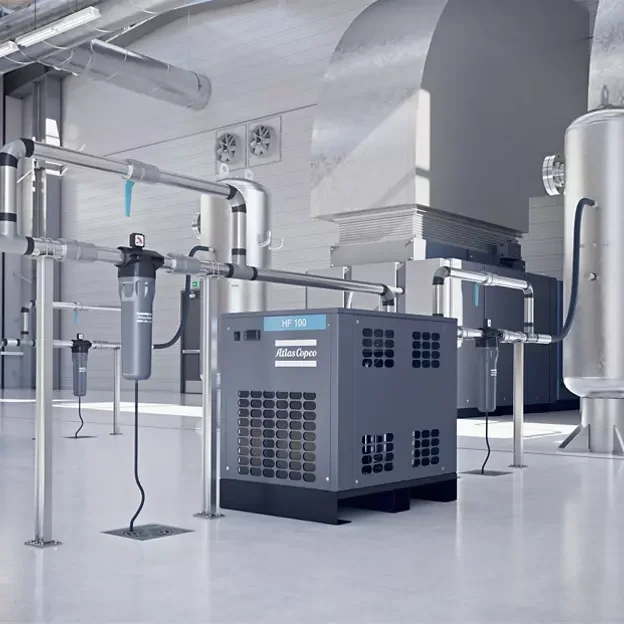
SMARTLINK Remote Monitoring
Atlas Copco’s SMARTLINK remote monitoring system provides 24/7 chemical plant operations with real-time information about system conditions. Predictive maintenance, immediate fault notifications, and remote optimisation work together to eliminate unforeseen downtime.
Energy Efficiency: A Major Cost-Saving Opportunity
Did you know that compressed air could be responsible for more than 10% of your plant’s total electricity bill? Making a few changes to your system could save you big bucks.
- Variable Speed Drive (VSD) Compressors: If your plant or system has variable air demand, a VSD compressor automatically changes its motor speed to regulate output. As a result, it can cut energy use by 50% or more.
- Heat Recovery: Did you know that up to 90% of the electrical energy used by a compressor is converted to heat? Heat recovery systems trap thermal energy to heat process water or even facilities.
- Leak Detection: Did you know that the average unmanaged system loses 20-30% of its air through leaks? An ultrasonic leak detection audit will help find and quantify every leak so you can make targeted repairs with immediate energy savings.
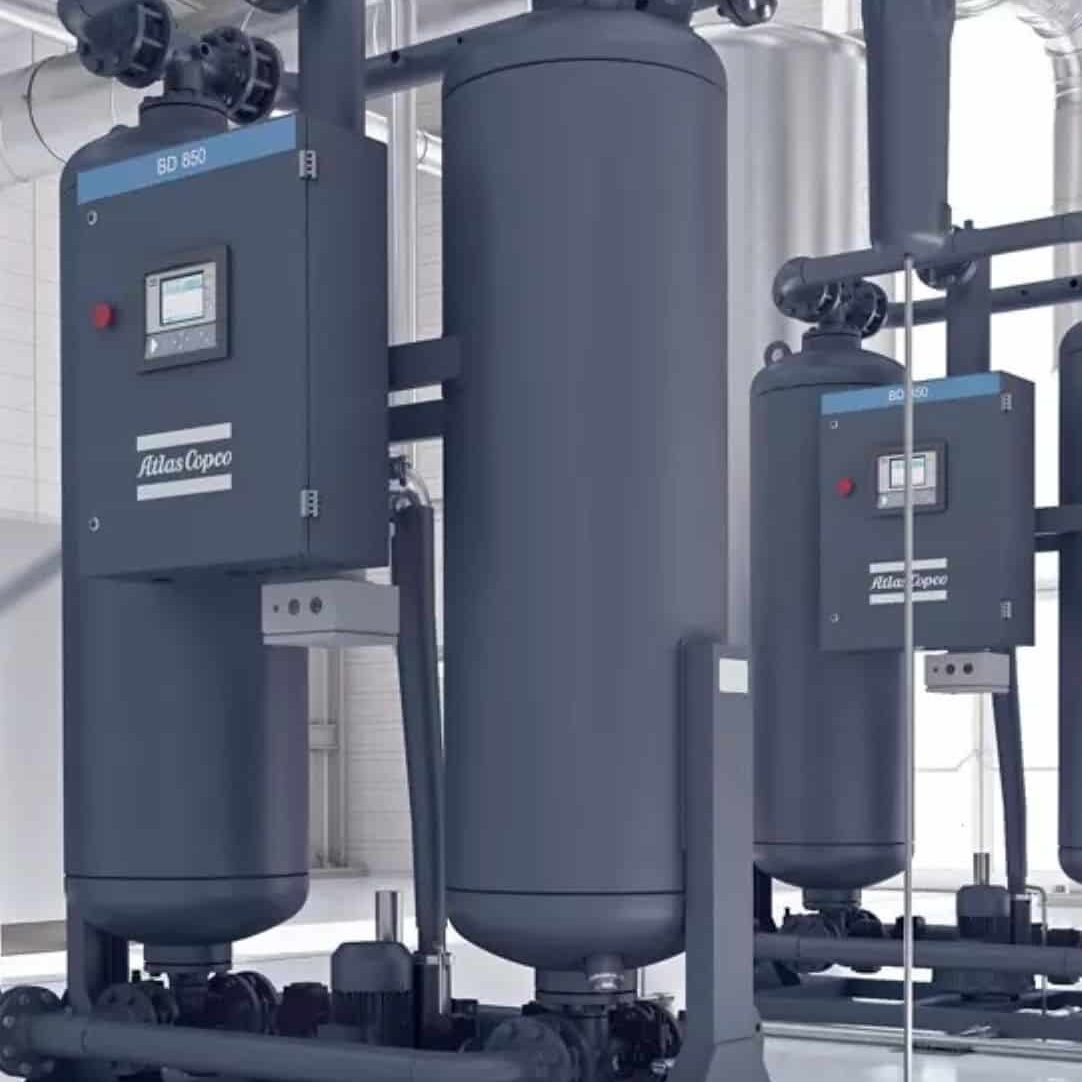
Ensuring Safety and Compliance in the UK
Operating in the UK chemical industry requires strict adherence to a framework of safety legislation. A compressed air system is subject to several key regulations.
ATEX Directives
For any areas with potentially explosive atmospheres, the ATEX directives are a legal mandate. Hazardous areas must be classified (e.g., Zone 1 or Zone 2), and any equipment used within them must be appropriately certified. We supply ATEX-compliant compressors and equipment designed for safe operation in these environments.
PSSR 2000 Compliance
The Pressure Systems Safety Regulations 2000 (PSSR) exist to prevent the uncontrolled release of stored energy. Any system with a pressure vessel over 250 bar-litres requires a Written Scheme of Examination (WSE). This legal document must be drawn up and certified by a "Competent Person," who also conducts the statutory examinations. Anglian Compressors, a branch of Atlas Copco, provides this expert service to ensure you remain fully compliant.
Condensate Management
Oil-lubricated compressor condensate is oil-contaminated and considered a hazardous waste, which requires specialist and expensive disposal. Condensate from a Class 0 certified oil-free compressor is clean and non-hazardous, eliminating the need for oil-water separators or unsafe waste handling – a significant cost and compliance benefit.
Your Strategic Partner for Compressed Air Systems
For chemical facilities where uptime is critical, a local, expert service partner is a significant advantage. Based in Peterborough, Anglian Compressors, a branch of Atlas Copco, provides rapid-response support across East Anglia and the Midlands.
Our approach is to become a strategic partner in mitigating risk, ensuring regulatory compliance, and enhancing operational efficiency. We provide a complete service portfolio, including:
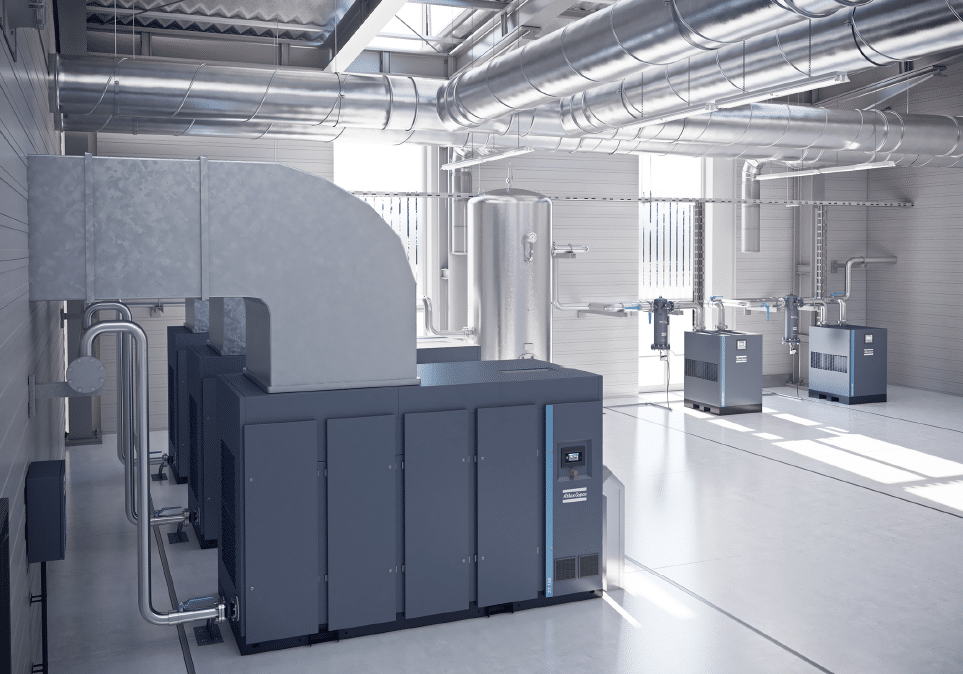
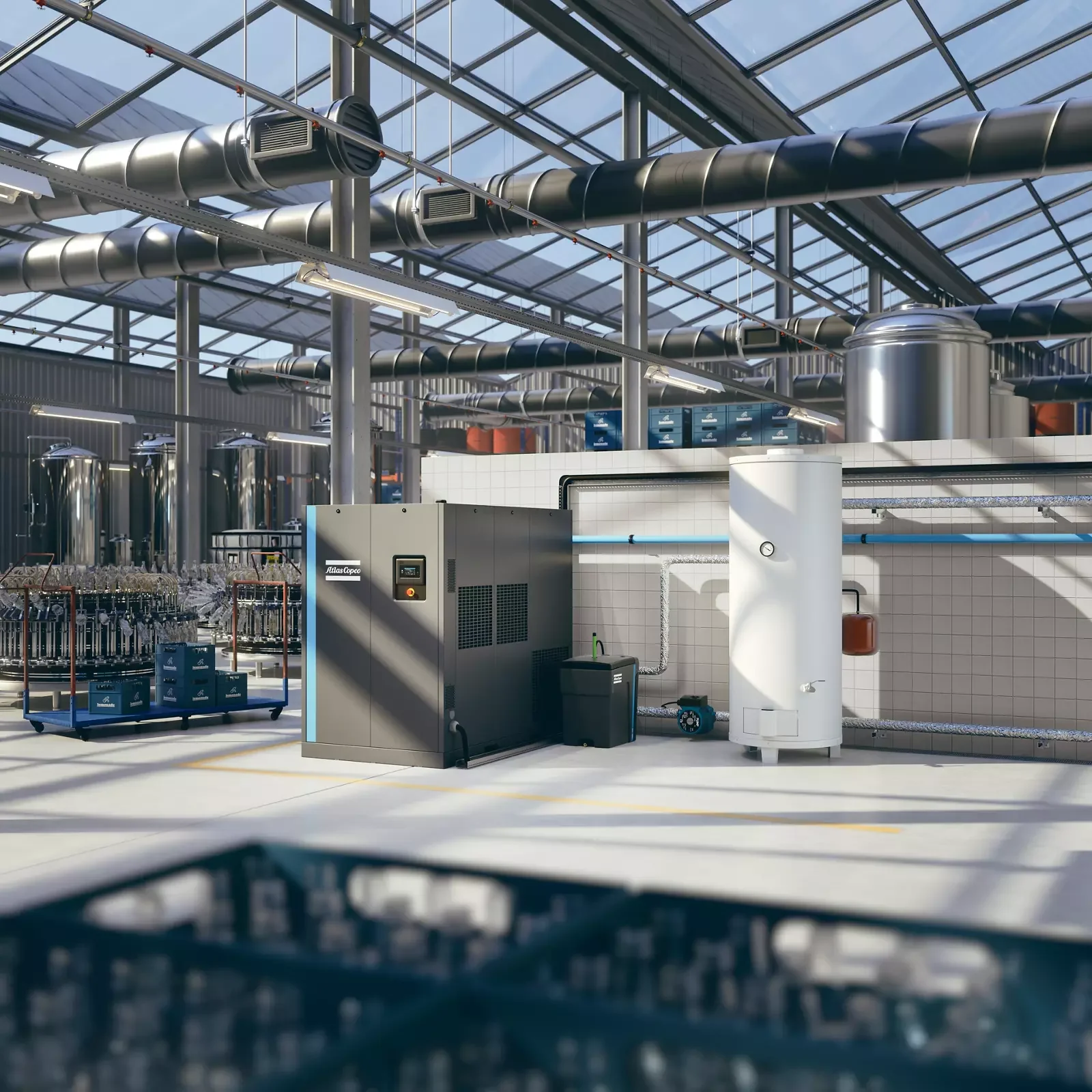
- Turnkey System Design and Installation
- Proactive Maintenance and PSSR Compliance Management
- Energy Audits and Leak Detection
- Emergency Call-Out and Equipment Hire, including specialist oil-free and ATEX-certified portable units.
We combine a deep understanding of the local industrial landscape with world-class technical expertise. Our goal is to ensure your compressed air system is a source of reliability and efficiency, not risk. For parallel challenges in a regulated industry, see Air Compressors in the Pharmaceutical Industry.
Partner with an Expert in Chemical Air Systems
Selecting the right compressed air system for your chemical manufacturing facility is a significant initial decision that will have an impact on both the quality of your product and your profits. Product contamination can compromise quality, reducing yields and profits, and pose a significant health and safety hazard to plant personnel and maintenance staff. Anglian Compressors, a branch of Atlas Copco, can work with you to ensure you invest in the correct specification for your compressed air system and provide long-term support for your equipment.
This can include expert technical support for maintenance and compliance management, in line with ATEX or Class 0 standards for your facility. Call Anglian Compressors, a branch of Atlas Copco, today for a no-obligation system audit or bespoke specification consultation. We can also assist you in discussing ATEX or Class 0 compliance for your manufacturing plant.
